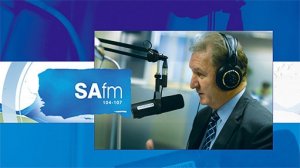Every Friday, SAfm’s radio anchor Sakina Kamwendo speaks to Martin Creamer, publishing editor of Engineering News & Mining Weekly. Reported here is this Friday’s At the Coalface transcript:
Kamwendo: South Africans want to add more value to the metals and minerals that they mine to create more jobs.
Creamer: This started with the State of the Nation Address when President Cyril Ramaphosa urged South Africans try and not just the export raw materials that they mine, but also to try and add as much additional value to them while they are still in the country. This was followed by a debate and it came down to Minerals Council South Africa, which put out a statement saying, yes, if there’s a business case for this, let's go for it, because there are jobs that can be created.
They also said to the government rather use a carrot than a stick and incentivise us to beneficiate our metals and minerals rather than penalise us if we fail to do so, because incentivisation will be far more meaningful and far more successful. Then, up popped well-known mining luminary Bernard Swanepoel who actually has already rethought everything in the manganese beneficiation front. So, he is personally a very good example of what can be done to add value to your metals and minerals. Now, he is talking not just about the mining side, or the end-product side, but he is talking about the processing space in between that.
What he has done in Mbombela with his MMC company, is create manganese sulphate from the manganese ore than is mined in South Africa’s manganese-rich Northern Cape. What is remarkable is that MMC of Mpumalanga is the only company in the world, outside of China, to produce manganese sulphate, which is desperately needed in the electric vehicle market and throughout the world. Electric vehicles are just emerging at a very, very fast pace.
Bernard Swanepoel, the chairperson of MMC, is urging South Africans to relook at the middle of what happens between the mining side of things and original equipment manufacturing or finished-product side of things. Within that supply chain is a big space and filling that space overwhelmingly at the moment is China, on just about every metal and mineral that there is. If South Africa could see a way clearer with other metals and minerals, like Swanepoel’s Mbombela company has seen with manganese, this could be fantastic for jobs and exports from South Africa and everybody's rethinking and reimagining.
Kamwendo: A black-owned South African coal mining company is leading the way in the generation of sun and wind energy.
Creamer: This is amazing. This is Seriti Resources, which is 90% black-owned. Seriti Resources went into coal. They have got some of the biggest coal mines in South Africa at the moment. They are supplying into Eskom and supplying the world because they export coal as well. But they say they don't want to just be known as a coal mining company; they want to be known as an energy company. So, they have gone into Seriti Green and already, if you go to Mpumalanga, you will see very tall wind turbine masts going up, very high masts.
These will generate energy from wind and Seriti Green believes that it will also be going into sun energy aswell. They see going into renewable energy as a very important extension of coal mining and they are setting an example for other coal miners, because this is really the way to go. Coal mining has got a bit of a finite horizon and although they are in coal and they will be in coal for a long time, they also want to be in energy that is clean and green. They have already made that move, which again, is creating work and jobs in the Mpumalanga province, our coal province..
Kamwendo: Public-private partnership is providing powerful performance potential on South Africa’s iron-ore line.
Creamer: You know, the iron-ore railway line to the Port of Saldanha has tremendous potential. South Africa is simply not exporting the volume of iron-ore that we could and should. If that rail line was really doing well and the port is doing well, South Africa could export a lot more iron-ore, and by exporting, we could strengthen the rand, because the demand for the rand through exportation uplifts the strength of our currency.
Exportation strengthens the rand and a strong rand has very important implications for the people of South Africa. So, what is being pointed out now by Mpumi Zikalala, she is CEO of Kumba Iron Ore, is that the a lot of promise is coming from this public-private partnership, where she is already experiencing invaluable transparency and there is a big report coming out before September that will probably eventually put South Africa’s iron-ore line and our rail logistics into a far more competitive position.
Kamwendo: Thanks very much. Martin Creamer is publishing editor of Engineering News & Mining Weekly.
Edited by: Creamer Media Reporter
EMAIL THIS ARTICLE SAVE THIS ARTICLE
ARTICLE ENQUIRY
To subscribe email subscriptions@creamermedia.co.za or click here
To advertise email advertising@creamermedia.co.za or click here












